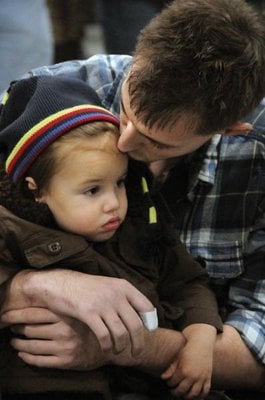The Importance of Fatherhood: Johnny Joey Jones Calls for Stronger Male Role Models in America
In a passionate address, Johnny Joey Jones, a Fox News contributor, discusses the current state of American society, drawing attention to rising violence, chaotic scenes in cities, and the growing absence of traditional family values. He begins by questioning whether these issues are simply the result of unfortunate societal shifts or if they are part of a more calculated effort to weaken individualism, ultimately diminishing the role of fathers in shaping the next generation.
.jpg)
Jones starts by highlighting the rampant violence and disorder that have plagued various U.S. cities. From senseless looting sprees in retail stores to aggressive behavior in public spaces, Jones points to a growing lack of personal responsibility and respect for authority. “What’s going on in this country?” he asks. “Is it just a sign of the times, or is something more deliberate happening?”
According to Jones, these issues stem from a series of compounded failures, one of which is the erosion of family values. He argues that as the government continues to spend excessively and encroach on personal freedoms, it has also sought to replace the role of parents—specifically fathers—by taking on the role of a moral compass for the nation. In his view, this is not only a dangerous shift but one that undermines the foundation of American society.
Jones focuses on the absence of father figures in American households, noting that many of today’s young men are growing up without the proper guidance and discipline that fathers traditionally provided. “Who’s supposed to teach them right from wrong?” he asks, referencing recent violent acts committed by young men, including school shootings and gang-related activities. These disturbing events, he suggests, often reflect a lack of proper upbringing and moral guidance, which fathers have historically been tasked with providing.
In support of his claims, Jones points to research from The Fatherhood Project, which highlights the critical role fathers play in shaping the emotional, academic, and social development of children. According to the project, children who grow up with involved fathers are not only more likely to perform better in school but are also less likely to engage in delinquent or risky behavior during adolescence. Furthermore, these children are twice as likely to attend college and secure stable employment in adulthood.

Jones goes on to emphasize the masculine role that fathers play in teaching important life skills such as discipline, respect, and emotional control. He argues that men, in particular, have a unique responsibility to model these qualities for their children. “It’s the dads who matter in this conversation,” he asserts, stressing that men bring a necessary balance to raising children by showing discipline and providing the tough love that many children need in their formative years.
While acknowledging the invaluable role women play in nurturing and raising children, Jones underscores that it is the absence of fathers—particularly in the lives of boys—that leads to many of the problems currently plaguing society. He points out that young men without strong male role models often struggle with understanding how to respect authority or control their aggression. Without the guidance of a father figure, these boys may fail to learn how to channel their emotions and become productive members of society.
This absence, according to Jones, is a key factor in the increasing instances of mass shootings, gang violence, and other forms of anti-social behavior. “Who can respect authority when the authority figure didn’t respect them enough to be there?” Jones asks, posing a poignant question about the long-term impact of fatherlessness.
He also draws attention to the staggering statistics that reveal the extent of fatherlessness in the U.S. According to Jones, a third of all children in the country are growing up without their biological father present in the home. This amounts to nearly 25 million children—boys and girls—who are missing out on the important lessons and guidance fathers traditionally provide.
For Jones, the issue is not just one of social justice but of moral responsibility. “We can conceive children in many opportune ways and times, but once they’re here, they’re our responsibility,” he says. He urges men to embrace fatherhood as a blessing and a vital purpose, one that requires full engagement and commitment. Rather than lamenting the challenges of raising children, Jones believes men should view fatherhood as one of the greatest opportunities they will ever have.
Jones concludes his message with a powerful call to action: “Men, step up and raise your kids.” He reminds men that being a father is not just about fulfilling a duty, but about taking pride in the responsibility. He emphasizes that strong men create easy times, while weak men create difficult times, but men who are absent altogether create chaos and disorder.
In an era where many are questioning the state of American values and where the traditional family structure seems increasingly under threat, Jones’ remarks serve as a reminder of the critical role fathers play in shaping the future of society. His message is clear: to reverse the tide of violence and instability, men must reclaim their role as fathers and mentors. Only then can the next generation be equipped with the tools they need to become responsible, respectful, and successful adults.

As Johnny Joey Jones advocates for stronger father figures, his call for action is one that resonates with many parents, especially those concerned about the direction in which American society is heading. The absence of fatherhood, according to Jones, is not just a societal issue—it’s a moral one that requires immediate attention. Only by acknowledging and addressing this crisis can we hope to restore the moral fabric that has long been the foundation of American strength and stability.